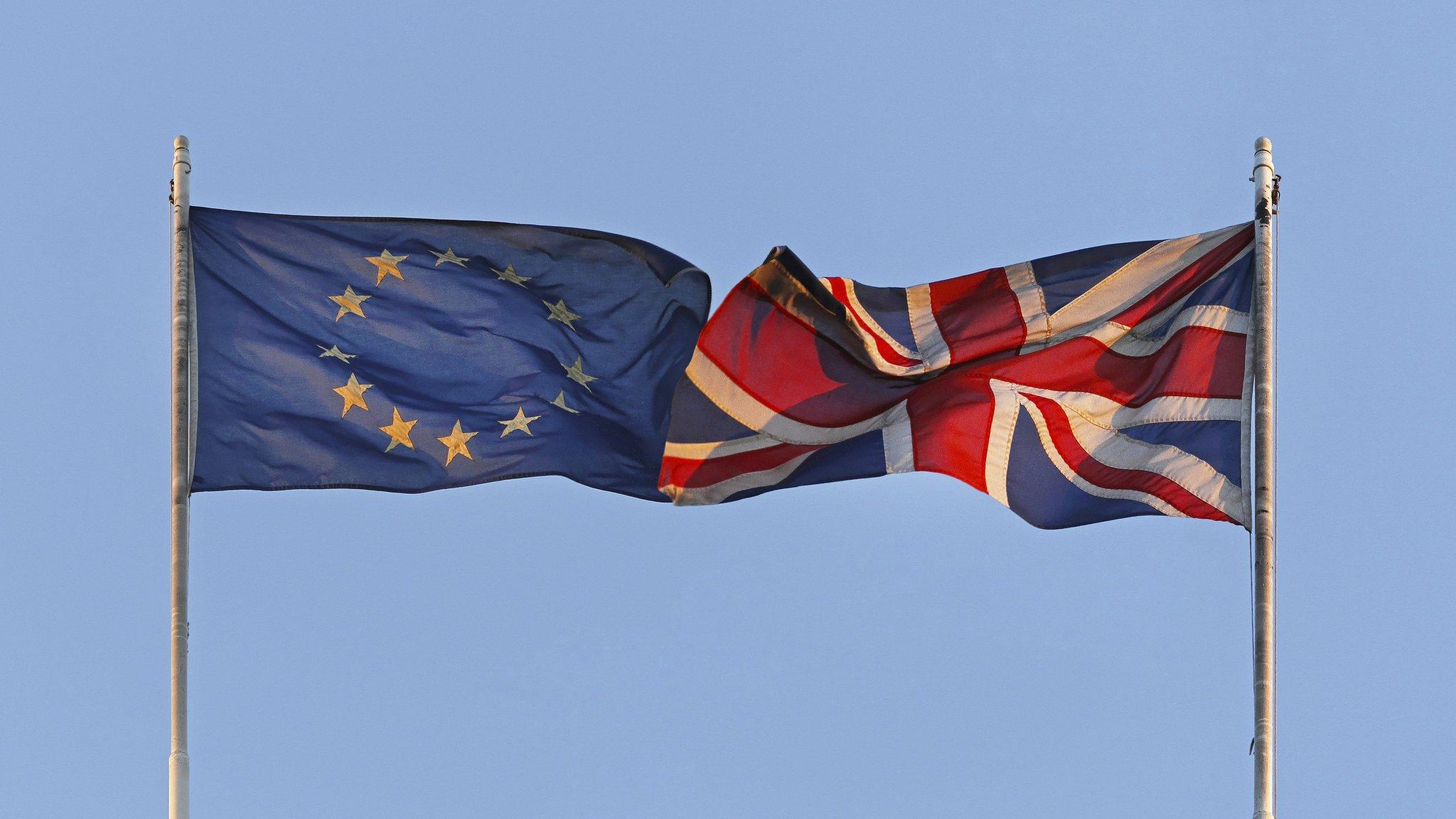David Cameron: EU reform bid getting 'a good response'
- Published
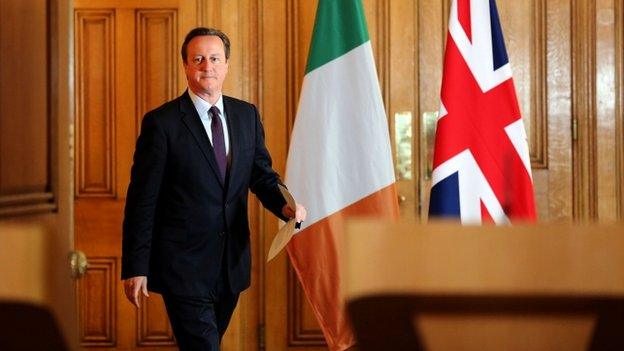
Mr Cameron is trying to drum up support among European leaders for his reform proposals
David Cameron has said his negotiations to reform the UK's relationship with the EU are getting "a good response".
But the PM cautioned that the process will "take time" and there will be "ups and downs" in the months ahead.
He has been holding bilateral talks with Irish PM Edna Kenny and European President Martin Schulz as he continues to press for changes in the EU.
Mr Kenny vowed to work constructively with the PM on his bid, while Mr Schulz said compromise would be needed.
Meanwhile, German chancellor Angela Merkel has said the UK must consider what role it wants to play in the European Union.
She said she wanted the UK to remain an active member of the bloc.
The UK's position will be collectively discussed by European leaders for the first time at the European Council summit starting on 25 June.
Mr Cameron has said he wants to speak to all his 27 EU counterparts and other key players to explain his renegotiation aims ahead of the meeting.
Senior Tory MPs will also outline their demands for EU changes on Thursday.
'Common ideas'
Mr Cameron held bilateral talks with the Irish Taoiseach on Thursday afternoon over a working lunch of baked ricotta and grilled asparagus, sea bass and vegetables, followed by lemon panna cotta with strawberries.
At a joint press conference after, the PM said: "The UK and Ireland share a strong desire to make the EU more competitive, to prioritise free trade agreements with growing markets across the world. We need the EU to be driver for growth, not a lag on growth.
"We found a lot of common ground today and I'm pleased that the Taoiseach is willing to work with us to find solutions to these issues."
Addressing reporters, Mr Kenny said he and David Cameron shared "very similar views on a range of issues."
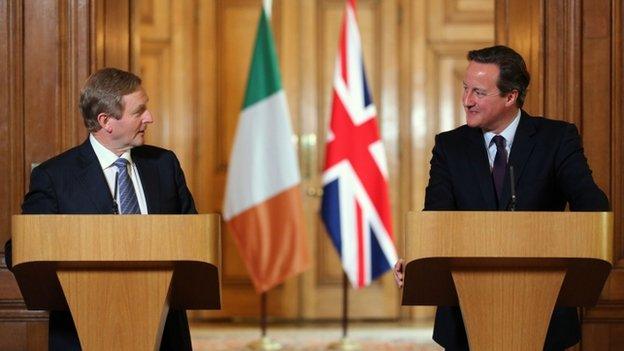
It was in both Ireland and Europe's interest that the UK remained a key player in the EU, he said, adding that he wanted to see the country vote 'Yes' to staying in.
"In that we will be as supportive and as constructive as we can. It doesn't mean we will follow you blindly on every issue.
"But insofar as the process is concerned I want to see that leading to a decision by the British people to stay in European Union because that is where the future for everybody lies," Mr Kenny said.
Earlier in the day, Mr Cameron held a working breakfast with European President Martin Schulz at Downing Street, as part of his push for changes to the EU.
Speaking after the event, Mr Schulz said there were "different views" among EU countries about the UK's proposals but that there were also areas of "common ground".
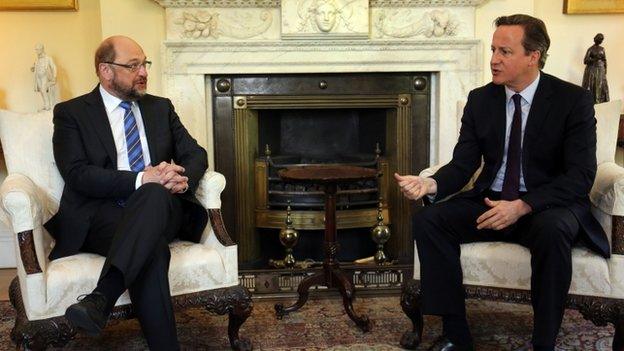
Mr Cameron (r) talks EU reform with European Parliament President Martin Schulz
The German politician, who previously led the socialist bloc of MPs in the European Parliament, said: "Dialogue is necessary. Solutions are always coming via dialogue and at the end via compromise."
"There is a long list of common interests and I think common ground could be found by analysing and discussing content. That is what we did.
"There were some controversial items and it is not surprising that in the European Parliament some views are different than here in London," he added.
Mr Schulz said they had discussed how they could stop "abuse" of welfare systems while ensuring the fundamental rights of citizens under the EU treaties were guaranteed.
Mr Cameron said: "We have got a long way to go in this reform and renegotiation, a lot of difficult issues to discuss, things that I believe fundamentally need to change, but it has been good to start these discussions today."
The prime minister has said he hopes to secure a "better deal" for the UK in Europe before putting it to a public vote in an in/out referendum in 2017.
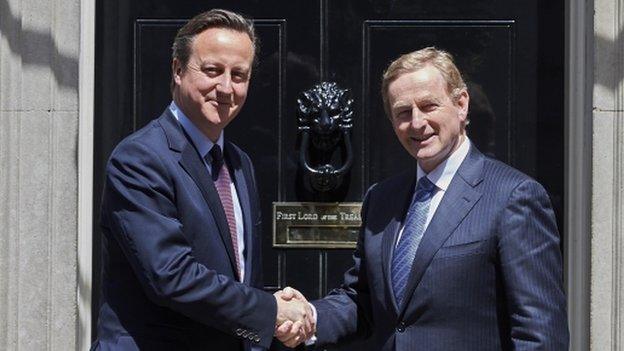
Mr Cameron is also holding talks with Irish Taoiseach Enda Kenny
Speaking in the German Parliament, Ms Merkel it was "not the first time that a country has raised doubts about its role in the EU".
"In 1992 it was Denmark, in 2008 Ireland. I'm sure we can succeed this time too," she said.
The German chancellor is to ask European Council President Donald Tusk at the EU summit next week to take charge of negotiations with the UK.
But she warned: "There can be no contradiction of the EU founding principles. Free movement is not up for discussion."
'Ever closer union'
Ahead of the meeting, Mr Schulz said he wanted to hear some "concrete proposals" from Mr Cameron in areas such as welfare, immigration and the powers of national Parliaments.
"Many on the continent underestimate the importance of the UK and many in the UK underestimate the importance of the continent. We need to bring these groups together," he told the BBC.
He also told the Guardian that Mr Cameron's hopes of scrapping "ever closer union" in the EU would require treaty change and that would not happen.
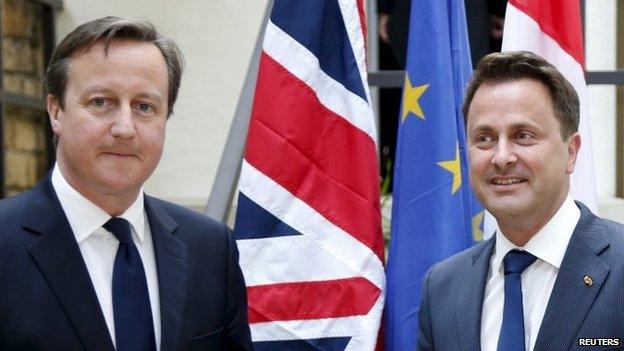
Mr Cameron, seen with Luxembourg prime minister Xavier Bettel, has said he wants to talk to all 27 EU counterparts by next Friday
Mr Cameron has embarked on a flurry of diplomatic activity to set out his broad aims and sound out the opinions of other leaders.
He has spoken face-to-face with the leaders of Germany, France, Italy, Poland, Belgium, Luxembourg, Spain and Romania among others. After meeting Mr Kenny and Mr Schulz, he will travel to Slovenia.
Speaking after talks with Italian PM Matteo Renzi on Wednesday, Mr Cameron said the pair discussed the "importance of reform and change in Europe" and had "common perspectives and some common ideas on the need for competitiveness and flexibility".
Mr Renzi stressed the importance of the UK remaining in the EU. "The European Union for us without the UK is impossible so we will discuss in the next weeks and the next months about this point," he said.
But ahead of Mr Kenny's visit, current and former Irish ministers have expressed their concerns about the possibility of the UK exiting the EU, ex-prime minister Bertie Ahern telling the BBC such a move would be "senseless".

EU referendum in focus
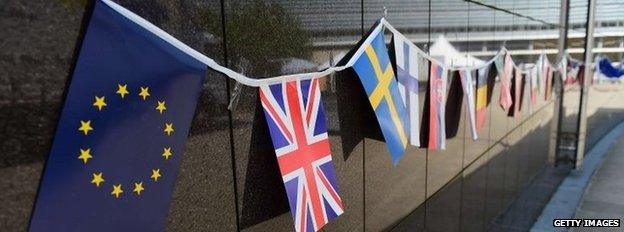
David Cameron is starting renegotiation of the terms of Britain's EU membership ahead of a referendum. Here is some further reading on what it all means:
Q&A: The UK's planned EU referendum
UK and the EU: Better off out or in?

Bulgaria's foreign minister Daniel Mitov said the UK needed to set out its objectives in "black and white", adding that if the principle of freedom of movement across Europe was preserved, other things could be discussed.
Mr Cameron has insisted the renegotiation process will be conducted at the very highest level and in private, urging people to ignore the inevitable "noise" surrounding the issue and to focus on the outcome.
Leading Conservative Eurosceptics, including Sir Bill Cash, Bernard Jenkin and John Redwood, will set out their minimum expectations for a reformed relationship in a pamphlet on Thursday.
It comes as MPs continue debating the EU Referendum Bill, which must be approved by Parliament before a vote can take place.
- Published30 December 2020

- Published17 June 2015
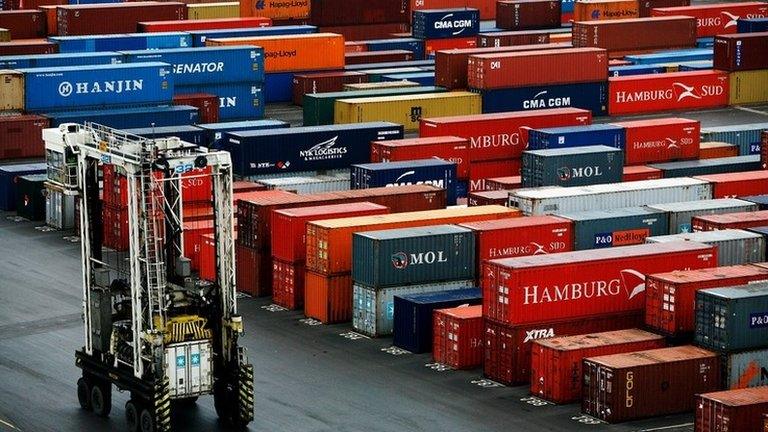
- Published16 June 2015
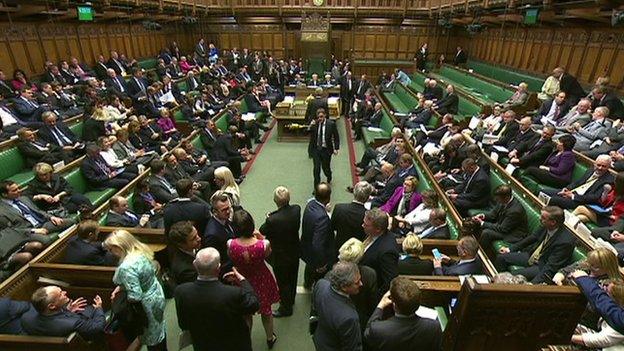
- Published20 February 2016
